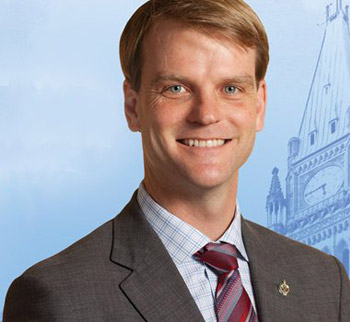TORONTO — A few weeks ago, when Liberal Party leader Justin Trudeau addressed the congregation at the Beth Tikvah Synagogue as part of its Visions for Canada series, he suggested a question should be posed to Chris Alexander, the next in line in the shul’s Q&A program. Ask him to justify the government’s decision to deprive refugee applicants of health-care benefits, he suggested.
Well, that’s just what happened last week when Rabbi Jarrod Grover asked Alexander, minister of citizenship and immigration, to explain the government’s thinking as it tried to balance the needs and commitments to Canadians with the policy of protecting foreigners in Canada.
The government will never agree to provide bogus refugee claimants health benefits that go beyond those provided Canadians, Alexander said.
Until the federal government instituted reforms, Canadian taxpayers were paying for a lot of things Canadians themselves were not getting – something for which there was no public support. Reforms to health care that had been doled out to refugee claimants have saved taxpayers $200 million over five years, he said.
“We say, number 1, that bogus refugee claimants should never have access to health care” but should be in the same position as visitors to Canada, adding emergency hospital care will continue to be provided.
(One day before Alexander spoke, lawyers for refugee advocacy groups asked a Federal Court judge to declare unconstitutional government cuts to refugee health care.)
While reforms to the system were being implemented, Canada continued to be generous in terms of its admission policy, coming behind only the United States among all countries admitting refugee applicants. “It’s a record we are proud of that never gets reported,” Alexander said.
Immigration issues were one area addressed by Alexander, but the question and answer session led off by Rabbi Grover included queries about Iran, Israel, veterans affairs, unemployment, Pakistan and the new Canadian economy.
This government’s policy on Israel reflects the convictions of the top leadership group of the Conservative Party and of the entire government caucus, Alexander said. “It is a deeply held conviction of our entire caucus and our entire party,” said Alexander, who greeted the audience with the Hebrew phrase, “erev tov chaverim” (good evening friends).
Since those pro-Israel views were first expressed seven years ago, more and more Canadians have come to “recognize the merits of our position…The Arab spring shows how malign the ideologies are in the region” and how difficult it is to transform to democracies, he said.
Israel remains a democracy and since the 9/11 attacks, North Americans have been reminded of the importance of supporting true friends and allies, “with whom we can have truly open conversations.”
Questioned about Iran’s nuclear program, Alexander said despite the interim agreement between the P5+1 countries and the Islamic nation, Canada would not relax its sanctions.
“We’ll judge Iran by its actions,” he said.
Iran remains a “soft” totalitarian state that engenders fear among its citizens. “It is a paranoid state” which under its previous president, Mahmoud Ahmadinejad, “gave voice to unprecedented anti-Semitism.”
Iran’s policy is geared to acquiring nuclear weapons. “We’d like for Iran to abandon those strategic objectives but we’ve seen nothing to suggest it.” he said.
Alexander, who entered politics after serving in the Canadian Foreign Service, was named Canada’s ambassador to Afghanistan in 2003 and two years later served as deputy special representative of the UN Assistance Mission to Afghanistan.
He said Pakistan seeks regional dominance and employs terrorism as a proxy to expand its power. Asked whether that should make Canada wary of permitting immigration from that country, Alexander pointed out that the top three sources for immigration remain the Philippines, China and India. Pakistan is among the top 10 sources of immigrants, he acknowledged, but all potential newcomers have to undergo security screening to determine whether they are members of the Muslim Brotherhood, terrorist groups or had participated in war crimes.
“You can’t have a policy to ban people from one country,” he added.
Asked about the recognition of foreign credentials, Alexander said the government is being proactive in informing immigrants early in the immigration process about Canadian standards and what is necessary for them to qualify in Canada.
He pointed out that Canada is most in need of skilled trades, and he drew surprised looks when he pointed out that welders can easily earn $150,000, with top people in the field pulling down salaries of $500,000.
Next on the agenda for the synagogue’s series is NDP leader Thomas Mulcair. No date has been set for his appearance.
